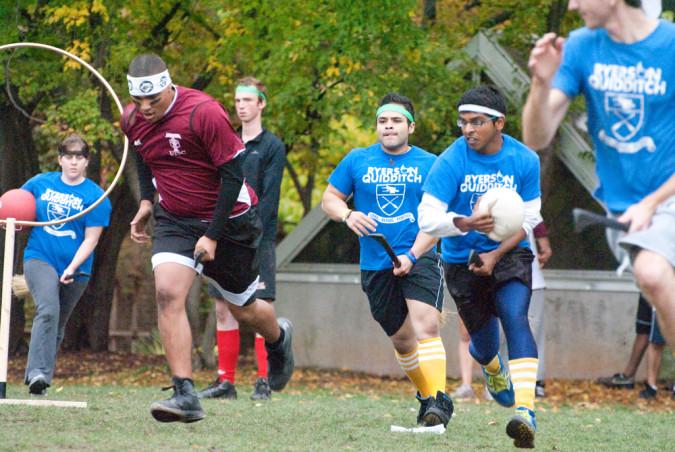By Charles Vanegas
The Ryerson Ridgebacks reached a new milestone last weekend, hosting the first annual Ryerson Quidditch Invitational tournament. The first competition of the 2012-13 season also featured teams from McMaster University, the University of Guelph, and both the St. George and Scarborough (UTSC) campuses from the University of Toronto, and was played in Kerr Hall Quad.
The event also brought another first for the Quidditch club: winning. For the first time in its three-year history, Ryerson’s team won – a overtime victory against McMaster. And they didn’t stop there, finishing with a record of 3-1 – good for second place after U of T, who went undefeated.
“Winning those [first] matches was fantastic after coming so close so many times last season,” said former captain Suraj Singh, who continues to help coach and play for the team.
“I want to look at this year as a fresh start, a fresh slate. So from that perspective we’re starting off on a positive note.” Singh said the key difference this year is numbers. Teams can carry up to 21 players, allowing for each team to have 14 substitutes available.
“We used to have just enough to fill out a squad. Without subs, you just get exhausted,” said Singh. “We’re near that (having a full roster), which is exciting.” This increase in membership also meant that most players at the invitational were playing in their very first competition for the Ridgebacks.
Among them was Sheel Radia, a firstyear engineering student. But the rookie’s lack of experience was easily made up for by his speed. Playing as the seeker, Radia won the team’s second match by capturing the snitch in overtime.
“It was a childhood dream to catch the snitch,” said Radia.
In the Harry Potter series, a Quidditch match only ends when a team’s seeker has captured the golden snitch, an erratic flying ball. In the real-life game, the snitch is a little sack tied to a person, much like a flag in flag football – usually one of the quickest and craftiest players from a nonparticipating team. But just like in the novels, the snitch can disappear from the playing field at any time, meaning seekers need to stay alert.
“You have to listen [closely] to other people,” said Radia. “You can hear them say ‘oh, the snitch went here,’ so you have to run over and see if [it’s] there. If not, you keep searching.” Despite receiving official athletic club status this year, which allows it to use Ryerson Rams branding, the team still prefers to be known as the Ridgebacks – after the Norwegian Ridgeback, a breed of dragon in the Potter series.
“We’re a club, not a varsity team.
And we’ve been the Ridgebacks unofficially since we started,” said Singh.
“So now it’s kind of half tradition, half nerdy inside joke.” And while the game itself comes from a work of fiction, the injuries are very real.
Quidditch is a contact sport, and as long as it isn’t done in a choking manner or from behind, tackling is allowed.
Shaughna Boara, a first-year RTA student, was taken to the hospital in an ambulance after suffering a minor concussion when a hit by a U of T beater sent her head into the turf.
“I was expecting [the level of contact], but not [the] ambulance ride,” said Boara. “The ground of the Quad is super hard.” Boara will miss the team’s next few practices, but said she expects to return in time for the Canadian Quidditch Cup on Nov. 11, which is hosted by Queen’s University in Kingston, Ont.
Students interested in joining the team can visit the Ryerson Quidditch page on Facebook or drop by a weekly practice. (Sundays at 4 p.m. in Kerr Hall Quad.)












Leave a Reply